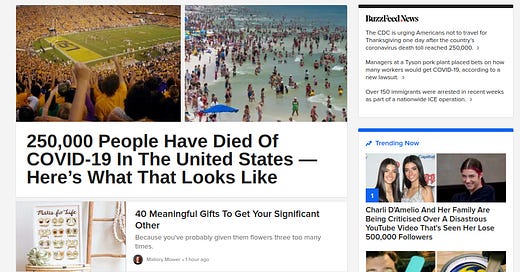Some loose thoughts on BuzzFeed/HuffPost
Digital media consolidation continues; how it plays out is anyone's guess.
Wasn’t going to blog today, but the Wall Street Journal just reported that BuzzFeed is acquiring the HuffPost, which is really quite the shining example of today’s digital media ouroboros.
For starters, according to the WSJ:
The acquisition is part of a larger deal between BuzzFeed and Verizon Media, a unit of Verizon Communications. Under the pact, the companies will syndicate content on each other’s platforms and look to jointly explore advertising opportunities. Verizon Media will get a minority stake in BuzzFeed as a result of the tie-up, the companies said.
Verizon Media is also making an undisclosed cash investment in BuzzFeed in addition to the stock deal for HuffPost, according to a person familiar with the matter.
Yes, Verizon is basically paying BuzzFeed to take HuffPost off its hands.
The telecom company has been trying to get out of the content business for a little while, as it focuses on 5G. Adweek reported in 2018:
Verizon sees value in selling quality network access to a range of partners across existing markets and any that might arise around 5G. In doing so, they’re reorganizing the media and advertising industries that sit atop their infrastructure.
“This is setting the blueprint for what I think the future of the modern media company may look like,” says Evan Hanlon, president of GroupM’s [m]Platform unit. “This, to me, is very much the first inning of a very long game.”
Rumors of Verizon Media looking to unload HuffPost have been swirling over the past year. The FT reported last October that Verizon was seeking buyers. It had sold Tumblr the previous month. Verizon Media CEO Guru Gowrappan later debunked that rumor and said Verizon was not selling HuffPost.
"Verizon Media's strategy has evolved over the past two years to focus on our core strengths-ads, commerce, content and subscriptions," Gowrappan said in a statement Thursday about the deal. "We've created a powerhouse ecosystem, built on a trusted network, that delivers an end-to-end experience for consumers and advertisers. The partnership with BuzzFeed complements our roadmap while also accelerating our transformation and growth."
Another interesting thing when talking about BuzzFeed’s business is its relationship to NBC, which has dumped $400 million into the digital darling and has played a big role in getting BuzzFeed to add display units across the site known for its sponsored content.
Back in April, buyers were telling me that BuzzFeed wasn’t a ‘must-buy’:
As one buyer talking anonymously as they weren’t permitted to speak publicly told me recently, “The numbers of engagement aren’t through the roof, so it’s hard to make the case to consider them because there's no real scale.”
Buyers have told me over the years that the outlet isn’t a ‘must-buy,’ however, there are pockets where a buyer will throw them onto a plan. Namely, dropping some quick bids programmatically to spend some client cash on the one hand, and on the other, put money into Tasty, the company’s food powerhouse, as it’s shown to pop with its audience.
The programmatic play for BuzzFeed was a curious one, as during the early parts of its life, execs swore up and down that it would never get into programmatic.
“They were forced to change with the times,” the buyer said. “It’s the only way to scale what it is you’re doing. If I were BuzzFeed, I’d use the phrase: if we don’t change, we’ll die.”
And now, if you’re a buyer, you can potentially get BuzzFeed inventory AND Verizon inventory AND NBCU inventory.
One other thing to think about: the digital media conglomeration and consolidation (think Vox Media buying NY Mag; the Gizmodo properties; etc) happens at a similar pace as the old guard (NBCU, Disney, Viacom) conglomerates, but at smaller numbers. BuzzFeed had the opportunity to sell for a billion dollars a few years ago. It didn’t take the money. Perhaps it should have. Anyway.
But not being a must-buy for advertisers hasn’t meant all doom for the company. BuzzFeed jumped into the DTC waters. From the WSJ:
BuzzFeed has long recommended products to its audience, earning a cut of the revenue when readers click the links in its articles and buy from the sites that actually sell the goods.
The digital publisher has now introduced a standalone website called BuzzFeed Shopping that lets visitors complete purchases without going anywhere else.
Many publishers earn so-called affiliate revenue, the slice of revenue they get when they help generate a sale, by linking from product mentions to retailers that finish the transactions. But shopping directly on media sites may become more common as consumer habits change and publishers continue to seek revenue beyond ad sales.
And of course there’s Tasty.
And the company said that this year they expected to break even this year, through cost cutting measures like furloughs and pay reductions, which were recently brought back.
The story of the HuffPost has been equally curious after Arianna Huffington sold the site to AOL for $315 million in 2011, who then flipped it to Verizon in 2015 as part of the AOL/Yahoo $4.4 billion deal. It’s been a long nine years of swimming upstream.
(Image via Nicholas Hunt/Getty Images, via WSJ)
With this acquisition, prepare for more layoffs; as there are always redundancies. In an interview with the AP, BuzzFeed CEO Jonah Peretti said
that the deal “won’t impact the BuzzFeed team at all.” He said that BuzzFeed is profitable this year thanks to “discipline around costs” and new revenue initiatives at the company.
Peretti said he plans to have conversations with HuffPost to understand the business before making further decisions.
Peretti was a co-founder of the HuffPost, and now that he’s in control of a company he built, I keep thinking of a 2014 column from Michael Wolff that is worth reading today, titled, “How bright is BuzzFeed’s future?”:
The Huffington Post — that is, BuzzFeed before BuzzFeed — has surely carved out a place for itself in new media. But it no long offers much illusion that it is a technology enterprise.
BuzzFeed, taking up where the HuffPo left off, will try, in something of a last stand, to show that digital media can become something far greater than an ad-supported content site, and, perhaps, even greater than old media when it was king. Based on the success of BuzzFeed's ambitions, Internet media may turn into an exciting business, or continue on its path to a hardscrabble one.
A circle has no end.
Thank you for allowing me in your inbox, today and every day. If you have tips or thoughts on the newsletter, drop me a line. Or you can follow me on Twitter. If you liked this edition, please consider sharing across your social platforms.
If you’re a newsroom hiring manager and looking for an experienced reporter, editor, manager, please let me know! Have a great afternoon.





